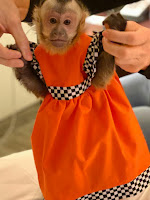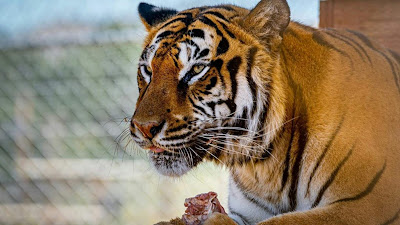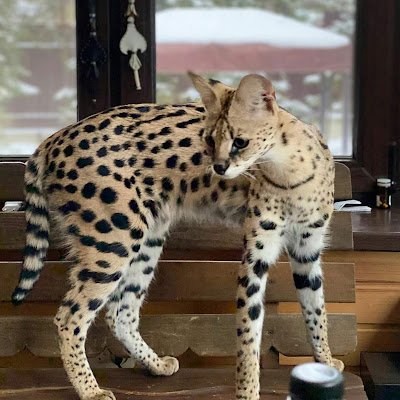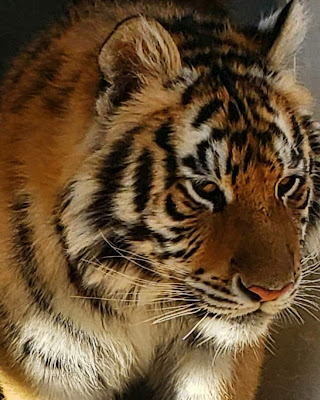Exotic Animals Banned From Montgomery County Fair In Gaithersburg
a person holding a dog: Say goodbye to wild exotic animals at the Montgomery County Agricultural Fair in Gaithersburg. © James Gourley/Getty Images Say goodbye to wild exotic animals at the Montgomery County Agricultural Fair in Gaithersburg.
GAITHERSBURG, MD — Bears, crocodiles, monkeys, and other wild exotic animals are now banned at the annual Montgomery County Agricultural Fair in Gaithersburg.
The city council on Tuesday voted 3-2 to approve an ordinance that prohibits the exhibition of those animals in traveling acts, but allows the display of domestic and livestock for educational purposes. Council Vice President Laurie–Anne Sayles and Councilmember Michael Sesma cast the dissenting votes.
In recent years, a growing number of communities across the United States have raised alarm about the use of wild animals in circuses and other traveling acts, arguing that the practice is unethical and inhumane.
"Animals aren't actors, spectacles to imprison and gawk at, or circus clowns. Yet thousands of elephants, bears, apes, and others are forced to perform silly, difficult tricks under the threat of physical punishment; carted across the country in cramped, stuffy semi-truck trailers; kept chained or caged in barren, filthy enclosures; and frequently separated from their families and friends — all for the sake of entertainment," animal rights organization PETA (People for the Ethical Treatment of Animals) said.
In May 2019, the Humane Society of the United States urged Gaithersburg officials to enact legislation that would tackle the use of animals for entertainment purposes. And since then, the town has worked with county fair officials who afflict the ban to develop a compromise ordinance.
Under this ordinance, domestic and livestock are still permitted at the fair, but must be "in or on temporary loan from zoos, licensed educational, research or medical facilities or institutions, provided the place of display is 100 miles or less away and therefore the refore the facility is meant to guard the security of the animals and the public," consistent with the draft's language.
Shortly before Tuesday's vote, a pair of city officials appealed to councilmembers, underlining the importance of passing this compromise ordinance.
"Why is there a need for an ordinance? The answer is two-fold: it's the wellbeing of the animals and also the public safety," Neighborhood Services Division Chief Kevin Roman said. "Performance animals as defined within the proposed ordinance includes chimpanzees, lions, tigers, wolves, bears, and elephants. Obviously these are wild animals and, as such, they are inherently dangerous. Combine that with natural behaviors and stress caused by life in captivity increases the risk of tragedy and incidents to occur."
Roman said no incidents have been reported at the Montgomery County Agricultural Fair, but emphasized that "if we leave the door open, there's always the potential for these types of incidents to occur."
Echoing a similar sentiment, Manager of Animal Services Simone Williams said adopting this ordinance is a necessary precaution the city needs to take.
"The city's animal control staff is big on education and prevention — prevention being the key word — because it relates to the adoption of this ordinance are going to be instrumental as the city will be seen as having taking the necessary precautions in protecting the citizens and animals that may be subject to any harm," Williams said.
Councilmember Sesma, however, said he was unsure that such precautionary steps were necessary.
"One of the questions I've always asked is can we actually need this given the change within the industry?Federal law is changing this. State law is changing this. The county quite punted this and passed it on to us because the fairgrounds is within the city," Sesma said. "I still question whether this is often needed because i do not think that the vendors that might provide these sorts of exhibits are getting to be in business for much longer . And I think the fair board organizers probably have a far better idea of the type of things that are not getting to be appropriate for the community that lives here as well."
While emphasizing that he doesn't support animal cruelty, Sesma said it was a "really low-impact ordinance" that wouldn't have a large effect on the city.
"It's not because I feel that I represent another view about how animals should be treated, it's I feel that this ordinance is unnecessary," said Sesma.
Sayles also chimed in, saying: "I don't want to support this ordinance."
"I believe that if this was such a threat to the community, i might hope that the administration would have done their due diligence in making a stronger ordinance at the county level," Sayles said.
Councilmember Ryan Spiegel, one among the three officials who supported the ordinance, called it "a compromise that carves our protections and exceptions for activities undertaken at the fairgrounds."
a person holding a dog: Say goodbye to wild exotic animals at the Montgomery County Agricultural Fair in Gaithersburg. © James Gourley/Getty Images Say goodbye to wild exotic animals at the Montgomery County Agricultural Fair in Gaithersburg.
GAITHERSBURG, MD — Bears, crocodiles, monkeys, and other wild exotic animals are now banned at the annual Montgomery County Agricultural Fair in Gaithersburg.
The city council on Tuesday voted 3-2 to approve an ordinance that prohibits the exhibition of those animals in traveling acts, but allows the display of domestic and livestock for educational purposes. Council Vice President Laurie–Anne Sayles and Councilmember Michael Sesma cast the dissenting votes.
In recent years, a growing number of communities across the United States have raised alarm about the use of wild animals in circuses and other traveling acts, arguing that the practice is unethical and inhumane.
"Animals aren't actors, spectacles to imprison and gawk at, or circus clowns. Yet thousands of elephants, bears, apes, and others are forced to perform silly, difficult tricks under the threat of physical punishment; carted across the country in cramped, stuffy semi-truck trailers; kept chained or caged in barren, filthy enclosures; and frequently separated from their families and friends — all for the sake of entertainment," animal rights organization PETA (People for the Ethical Treatment of Animals) said.
In May 2019, the Humane Society of the United States urged Gaithersburg officials to enact legislation that would tackle the use of animals for entertainment purposes. And since then, the town has worked with county fair officials who afflict the ban to develop a compromise ordinance.
Under this ordinance, domestic and livestock are still permitted at the fair, but must be "in or on temporary loan from zoos, licensed educational, research or medical facilities or institutions, provided the place of display is 100 miles or less away and therefore the refore the facility is meant to guard the security of the animals and the public," consistent with the draft's language.
Shortly before Tuesday's vote, a pair of city officials appealed to councilmembers, underlining the importance of passing this compromise ordinance.
"Why is there a need for an ordinance? The answer is two-fold: it's the wellbeing of the animals and also the public safety," Neighborhood Services Division Chief Kevin Roman said. "Performance animals as defined within the proposed ordinance includes chimpanzees, lions, tigers, wolves, bears, and elephants. Obviously these are wild animals and, as such, they are inherently dangerous. Combine that with natural behaviors and stress caused by life in captivity increases the risk of tragedy and incidents to occur."
Roman said no incidents have been reported at the Montgomery County Agricultural Fair, but emphasized that "if we leave the door open, there's always the potential for these types of incidents to occur."
Echoing a similar sentiment, Manager of Animal Services Simone Williams said adopting this ordinance is a necessary precaution the city needs to take.
"The city's animal control staff is big on education and prevention — prevention being the key word — because it relates to the adoption of this ordinance are going to be instrumental as the city will be seen as having taking the necessary precautions in protecting the citizens and animals that may be subject to any harm," Williams said.
Councilmember Sesma, however, said he was unsure that such precautionary steps were necessary.
"One of the questions I've always asked is can we actually need this given the change within the industry?Federal law is changing this. State law is changing this. The county quite punted this and passed it on to us because the fairgrounds is within the city," Sesma said. "I still question whether this is often needed because i do not think that the vendors that might provide these sorts of exhibits are getting to be in business for much longer . And I think the fair board organizers probably have a far better idea of the type of things that are not getting to be appropriate for the community that lives here as well."
While emphasizing that he doesn't support animal cruelty, Sesma said it was a "really low-impact ordinance" that wouldn't have a large effect on the city.
"It's not because I feel that I represent another view about how animals should be treated, it's I feel that this ordinance is unnecessary," said Sesma.
Sayles also chimed in, saying: "I don't want to support this ordinance."
"I believe that if this was such a threat to the community, i might hope that the administration would have done their due diligence in making a stronger ordinance at the county level," Sayles said.
Councilmember Ryan Spiegel, one among the three officials who supported the ordinance, called it "a compromise that carves our protections and exceptions for activities undertaken at the fairgrounds."




Comments
Post a Comment